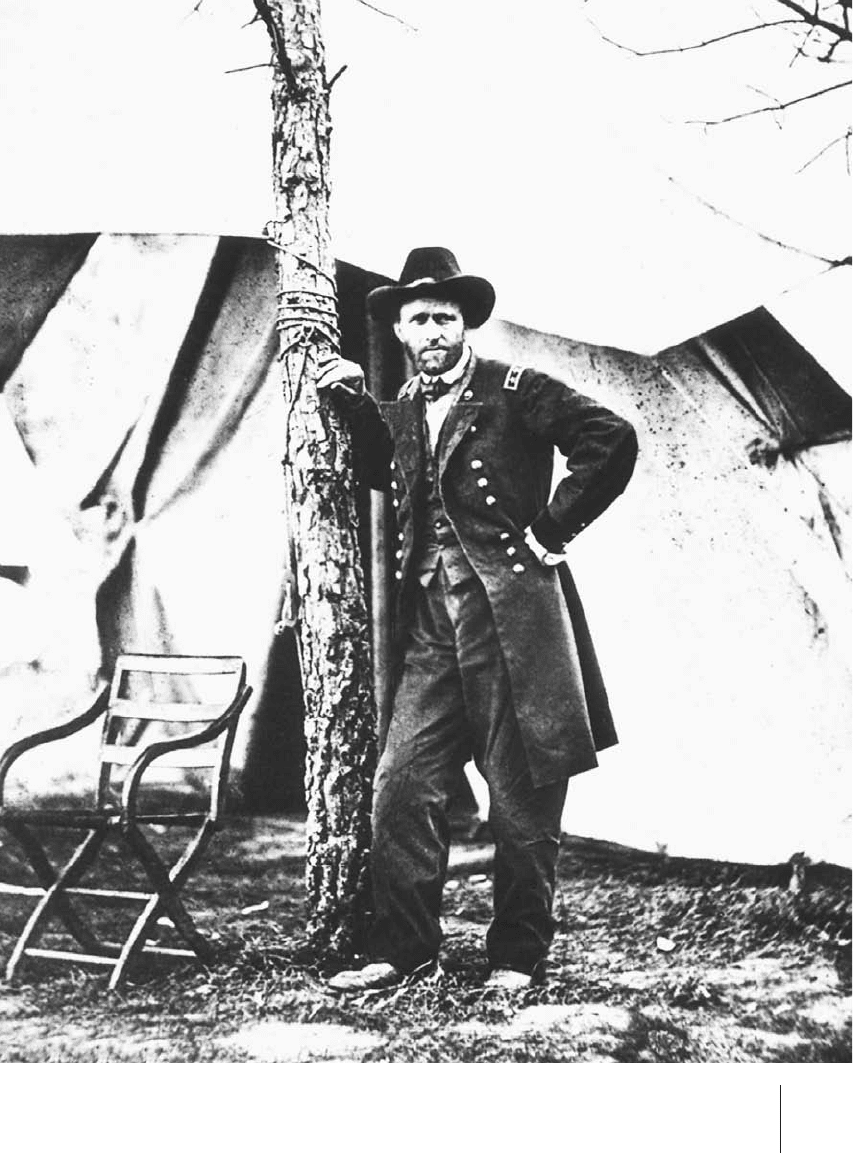Hillstrom K., Hillstrom L.C., Baker L.W. (ed.) - American Civil War. Almanac
Подождите немного. Документ загружается.


Ulysses S. Grant. (Courtesy of the National Archives and Records Administration.)
1864: The North Tightens Its Grip 195
Civil War Almanac MB 10/7/03 4:02 PM Page 195

Lincoln wins reelection
Sheridan’s decisive victory
over Early destroyed any hopes that
the Confederacy might have had of re-
gaining control of the Shenandoah
Valley. Moreover, it provided further
evidence to Northern voters that the
Confederacy was finally falling apart
after years of struggle and bloodshed.
“Coming on the heels of Mobile Bay
and Atlanta, Sheridan’s conquest was
a tonic that checked war weariness
and created a new spirit of optimism
[in the North],” wrote Bruce Catton in
The Civil War. “The war was visibly
being won, and although the price re-
mained high, it was obvious that the
last crisis had been passed. Sherman,
Farragut, and Sheridan were winning
Lincoln’s election for him.”
In November 1864, the Union
held its national elections, and the
people of the North returned Lincoln
to office for a second term by a com-
fortable margin. He received half a
million popular votes more than Mc-
Clellan, and won 212 of the 232 avail-
able electoral votes. Perhaps the most
impressive aspect of Lincoln’s reelec-
tion was the strong support he re-
ceived from Union soldiers in the
field. Nearly 80 percent of soldiers
who voted cast their ballots for Lin-
coln, despite their deep war weariness
and enduring affection for McClellan.
Lincoln’s reelection demol-
ished Confederate hopes that they
might somehow achieve independence
through a negotiated settlement. More-
over, it signaled a renewed Northern
willingness to support Lincoln’s war
had been designated the Army of the
Shenandoah—destroyed everything in
its path. Sheridan proclaimed that
“the people [of the Shenandoah Val-
ley] must be left [with] nothing but
their eyes to weep with over the war.”
Wherever they went, Sheridan’s troops
destroyed crops, burned barns, and
drove off livestock. Small bands of
Confederate guerrillas harassed Sheri-
dan’s troops, but their occasional raids
and sniper attacks could not stop the
destructive Union advance.
By mid-October, Sheridan’s
army appeared to have established
complete control over most of the val-
ley, and Sheridan made a quick visit to
Washington to report on the progress
of his campaign. While he was gone,
however, Early launched a surprise at-
tack on October 19 that caught his
Yankee foes completely off-guard. The
entire Union Army quickly broke into
a disorganized retreat, leaving behind
a large number of artillery guns and
various supplies.
As the Union troops fled down
the valley, however, they were met by
Sheridan, who was returning from the
capital. Sheridan stopped the panicky
retreat and swiftly reorganized his
army for a counterattack. A few hours
later, the Army of the Shenandoah
roared back into their camp in a rush
of hoofbeats and gunfire. Early’s
troops were completely unprepared
for Sheridan’s attack, and the Union
assault destroyed the rebel army. By
the time Early managed to withdraw
his army from the area, it had been
cut to pieces.
American Civil War: Almanac196
Civil War Almanac MB 10/7/03 4:02 PM Page 196

policies, which remained focused on
obtaining an unconditional Confeder-
ate surrender. “I am astonished at the
extent and depth of [the North’s] deter-
mination . . . to fight to the last,” wrote
a reporter for the London Daily News.
“[The people of the North] are in
earnest in a way the like of which the
world never saw before, silently, calm-
ly, but desperately in earnest.”
1864: The North Tightens Its Grip 197
The Sons of Liberty was a secret or-
ganization that developed in midwestern
Union states during the Civil War. Members
of this strange organization, which was also
sometimes known as the Order of American
Knights and the Knights of the Golden Cir-
cle, were dedicated to “states’ rights” and
fiercely opposed to the Republican Party. Its
members claimed that the organization was
devoted to legitimate causes such as pro-
motion of civil rights and providing political
support for antiwar politicians. Investigators
into their activities, however, claimed that
the group’s activities were treasonous. They
claimed that the organization’s efforts to
drain Northern support for the war effort
sometimes strayed into active support for
the Confederacy. In any event, the active
membership of the Sons of Liberty re-
mained small throughout the war, and the
organization’s plots almost always failed or
fell apart in the planning stages.
The Sons of Liberty sometimes
worked with Confederate spies based in
Canada and extremist members of the
Copperhead wing of the Democratic Party.
Plotting together, these men devised a
wide range of actions that were meant to
create chaos in the North. These plots in-
cluded schemes to rob Northern banks,
burn New York City, support anti-Lincoln
newspapers, and capture a Union warship
patrolling the Great Lakes.
Most of these plots collapsed, how-
ever. One major reason for their failure was
the fact that everybody knew that the Sons
of Liberty existed. As Northern police and
military organizations mounted efforts to
stop the organization, they discovered that
it was easy to place spies within the disor-
ganized group. When these spies learned of
Sons of Liberty plots, they passed the infor-
mation on to Northern law enforcement of-
ficials. As a result, the Sons of Liberty had to
abandon many of their schemes before
ever trying them.
Some people in the North har-
bored deep fears about the Sons of Liberty
and similar secret organizations. In a few
places, this fear was well-founded. In Mis-
souri, for example, the Sons of Liberty allied
itself with bands of Confederate guerrillas
that terrorized the state. For the most part,
however, the Sons of Liberty did little dam-
age to the North, and President Abraham
Lincoln never really viewed the group as a
major threat.
The Sons of Liberty
Civil War Almanac MB 10/7/03 4:02 PM Page 197

As Sherman’s “March to the
Sea” continued through the Confeder-
ate heartland, his army left a path of
sorrow and ruin in its wake. The Yan-
kee invaders razed (leveled to the
ground) hundreds of farms and plan-
tations, determined to hammer the
Southern people into submission.
Georgia’s suffering was made even
worse by a lawless group of thieves
and deserters who followed behind
Sherman’s force. These wild hooligans,
known as “bummers,” robbed and
burned anything that the army left be-
hind, terrorizing the local people in
the process.
Sherman completed his March
to the Sea in mid-December, and he
took immediate steps to take Savan-
nah from Confederate control. He
captured the city within a few days,
and on December 22 he sent a
telegram to Lincoln offering Savannah
as a “Christmas gift.” The seizure of
Savannah thus ended one of the most
successful Union campaigns of the en-
tire war. As Paul M. Angle pointed out
in A Pictorial History of the Civil War
Years, Sherman’s push to Savannah
brutalized both Southern morale and
Southern military capacity: “With
fewer than 2,000 casualties he had de-
stroyed a large portion of the war po-
tential of the deep South, he had
demonstrated that a large section of
the Confederacy was a defenseless
shell, and he had placed his army in a
position from which he could move
north and cooperate with Grant in a
final campaign against Lee.”
Sherman begins his “March
to the Sea”
Lincoln’s victory in the 1864
election further battered the morale of
war-weary Southerners. Jefferson
Davis responded to Lincoln’s reelec-
tion by proclaiming that the South
stood as “defiant as ever” thanks to
the “indomitable valor [intense brav-
ery] of its troops” and the “unquench-
able [unable to be satisfied] spirit of its
people.” But Northern military leaders
sensed that the Southern willingness
to continue the fight was wavering. In
the final weeks of 1864, General Sher-
man set out to break the spirit of the
Southern people once and for all.
Sherman rolled out of Atlanta
in mid-November with sixty thousand
troops, leaving the city’s factories and
public buildings in smoking ruins so
that they could not be used by the
Confederacy. His sights set on the
coastal city of Savannah, Sherman
marched eastward through the heart
of Georgia. He moved his army for-
ward at a leisurely pace, confident that
the Confederacy did not have the mil-
itary capacity to stop his progress.
Over the next few weeks, Sherman fed
and supplied his troops by seizing
whatever he needed from Georgia’s
farms and villages. His army then sys-
tematically destroyed any crops and
supplies that it did not use. “We can-
not change the hearts of those people
of the South,” stated Sherman. “But
we can make war so terrible and make
them so sick of war that generations
would pass away before they would
again appeal to it.”
American Civil War: Almanac198
Civil War Almanac MB 10/7/03 4:02 PM Page 198

Thomas crushes Hood in
Tennessee
At the same time that Sher-
man made his fearsome march
through Georgia, Hood moved into
Tennessee in a desperate gamble. The
Confederate commander hoped that
by threatening Nashville, which the
North had captured in 1862, he might
somehow lure Sherman out of Georgia
or regain rebel control of central Ten-
nessee. But Sherman ignored Hood’s
offensive, and Union general George
H. Thomas (1816–1870) quickly
moved against the rebel army.
As Hood traveled through
southern Tennessee, the Confederate
general understood that his chances of
waging a successful attack on
Nashville were very slight. After all,
his army had been reduced to fewer
than forty thousand men, and
Thomas had assembled fifty thousand
Union troops to defend the city. But
he pressed forward, unable to devise
any other plan of action.
On November 30, Hood at-
tacked Union troops under the com-
mand of Major General John Schofield
(1831–1906) in the town of Franklin,
twenty-five miles south of Nashville.
But the entrenched Federal troops
turned back the Confederate assault,
inflicting terrible damage on Hood’s
valiant but exhausted men in the
process. Two weeks later, Thomas fin-
ished the job at the Battle of
Nashville. This clash, fought on De-
cember 15 and 16, shattered Hood’s
dreams of conquering Nashville. It
also removed the Confederate Army of
Tennessee from active participation
for the remainder of the war.
1864: The North Tightens Its Grip 199
Civil War Almanac MB 10/7/03 4:02 PM Page 199

B
lack people from both the North and the South participat-
ed in the Civil War in a variety of ways. Free blacks from
the North tried to join the fight as soldiers from the earliest
days of the conflict. These men not only wanted to help free
the slaves in the South, but also felt that they could improve
their chances of gaining equal rights in American society by
proving their patriotism and courage on the battlefield. But
prejudice (unfair treatment because of their race) prevented
blacks from enlisting in the Union Army until late 1862. It
also created racial conflicts with working-class whites in
many Northern cities during the war years.
In the South, black slaves performed much of the
heavy work that was required to prepare the Confederacy for
war. They built forts, dug trenches, hauled artillery and sup-
plies, set up army camps, and acted as cooks and servants for
Confederate soldiers. Some free blacks in the South even
fought for the Confederacy in the early years of the Civil War.
However, after President Abraham Lincoln (1809–1865) is-
sued the Emancipation Proclamation, which freed the slaves
in 1863, Southern blacks increasingly realized what a Union
201
12
Blacks in the Civil War
Civil War Almanac MB 10/7/03 4:02 PM Page 201

ination. For example, they received
lower wages than white soldiers who
held the same rank, they did more
than their fair share of heavy labor,
and they were not allowed to become
officers. Despite these problems, more
than two hundred thousand black
men fought bravely for the Union.
Their courage and determination on
the battlefield earned the respect of
many white Americans and helped the
North win the Civil War. As a result,
black Americans were able to break
down many barriers of discrimination
after the war ended.
Northern blacks want to join
the fight
Many free blacks in the North
were happy when Southern states
began seceding from (leaving) the
United States in 1860. In fact, some
black leaders had been suggesting the
separation of Northern free states
from Southern slave states for many
years. These black leaders believed
that the U.S. government was obligat-
ed to protect slavery under the Consti-
tution. They had seen the number of
blacks held in slavery increase from
seven hundred thousand to four mil-
lion since the United States had been
formed almost nine decades earlier.
They knew that the federal govern-
ment had enforced the Fugitive Slave
Laws, which required people in the
North to help Southern slave owners
find and capture their escaped slaves.
Finally, black leaders believed that the
federal government would call out the
military to crush any major slave re-
bellions in the South. For these rea-
victory would mean for them. Thou-
sands of slaves escaped and took
refuge behind Union lines, and many
of those who remained in the Confed-
eracy stopped cooperating with South-
ern whites. Some Southern blacks
even aided the Union cause by de-
stroying Confederate property, spying
on troop movements, or helping
Union prisoners escape.
When black Americans were
finally allowed to join the Union
Army in 1862, they still faced discrim-
American Civil War: Almanac202
Words to Know
Abolitionists people who worked to end
slavery
Civil War conflict that took place from
1861 to 1865 between the Northern
states (Union) and the Southern seceded
states (Confederacy); also known in the
South as the War between the States and
in the North as the War of the Rebellion
Confederacy eleven Southern states that
seceded from the United States in
1860 and 1861
Discrimination unfair treatment of peo-
ple or groups because of their race, re-
ligion, gender, or other reasons
Emancipation the act of freeing people
from slavery or oppression
Union Northern states that remained
loyal to the United States during the
Civil War
Civil War Almanac MB 10/7/03 4:02 PM Page 202

sons, many free blacks felt that the in-
stitution of slavery would be more
likely to end if the South did not have
the support of the Union.
When the Civil War began
with the Confederate attack on Fort
Sumter in 1861, thousands of black
men volunteered to become soldiers in
the Union Army. They cited two main
reasons for wanting to join the fight.
First, they wanted to help put an end
to slavery. Second, they believed that
proving their patriotism and courage
on the field of battle would help im-
prove their position in American soci-
ety. “Once let the black man get upon
his person the brass letters, U.S., let
him get an eagle on his button, and a
musket on his shoulder and bullets in
his pocket, and there is no power on
earth which can deny that he has
earned the right to citizenship in the
United States,” said black abolitionist
Frederick Douglass (c. 1818–1895).
But Federal law prohibited
black men from joining state militias
or the Union Army, and many North-
ern whites wanted to keep it that way.
For one thing, they claimed that the
Civil War was not about slavery. They
called it a “white man’s war” and said
that its purpose was to restore the
Union rather than to settle the issue of
slavery. And since the war was not
about slavery, they felt that there was
no need to change the law so that
black people could join the fight. In
reality, the dispute between North and
South involved a number of different
issues, including the question of how
much power should be granted to the
individual states and how much
should be held by the federal govern-
ment. But in the end, slavery was the
one issue upon which the two sides
could not compromise.
Another reason that many
Northern whites did not want black
men joining the army was deep-seated
racial prejudice. Some whites believed
that they were superior to blacks and
did not want to fight alongside them.
They also thought that black men,
Blacks in the Civil War 203
People to Know
John Andrew (1818–1867) governor of
Massachusetts, 1860–66; organized
the Fifty-fourth Massachusetts Regi-
ment, the first Northern black unit in
the Civil War
Frederick Douglass (c. 1818–1895) abo-
litionist who was the first African Amer-
ican leader of national stature in U.S.
history
Thomas Wentworth Higginson (1823–
1911) abolitionist who led the First
South Carolina Volunteers, the first reg-
iment of former slaves in the Union
Army
Abraham Lincoln (1809–1865) sixteenth
president of the United States, 1861–65
Robert Gould Shaw (1837–1863) Union
colonel of the Fifty-fourth Massachu-
setts Regiment, the famous all-black
unit in the Civil War
Civil War Almanac MB 10/7/03 4:02 PM Page 203

Prejudice leads to race riots
in the North
Racial prejudice caused other
problems for Northern blacks during
the Civil War, in addition to prevent-
ing them from serving their country as
soldiers. At that time, many immi-
grants from Germany, Ireland, Italy,
and other European countries worked
in industrial factories in the North.
Working conditions in the factories
were not good in those days, and
many people worked long hours for
low wages. Some workers formed
groups called labor unions in order to
negotiate with their employers for bet-
ter working conditions and higher pay.
Most labor unions did not allow black
people to become members. When
employers did not meet the demands
of the unions, the members would
often refuse to work—or go on strike—
as a form of protest. Then the factory
owners would hire black workers, who
were not part of a union, to take the
place of striking workers. This practice
made many working-class white peo-
ple angry and resentful. But instead of
taking out their anger on their em-
ployers, they targeted black workers.
In 1862 and 1863, the job com-
petition between European immigrants
and Northern blacks sparked race riots
in several major cities. Some of the
most destructive riots occurred in
Cincinnati, Ohio, in July 1862. Angry
groups of Irish and German laborers set
fires and attacked people in the black
part of town, and then groups of black
workers retaliated the next day. The
mob violence continued for five days,
particularly those who had been
slaves, would be too cowardly and
subservient (helpful in an inferior ca-
pacity) to make good soldiers. Finally,
they worried that allowing blacks to
fight in the war would have negative
political implications. Several states
along the border between North and
South allowed slavery, but remained
part of the Union anyway. Some
Northern political leaders thought
that these border states would join the
Confederacy if the Union Army ad-
mitted black soldiers.
Black leaders in the North
were outraged at the policies and prej-
udices that prevented them from
fighting in the Civil War. They point-
ed out that black soldiers had fought
for the United States in both the
American Revolution (1775–83) and
the War of 1812 (June 1812 to Decem-
ber 1814). Frederick Douglass charged
that black men “were good enough to
help win American independence, but
they are not good enough to help pre-
serve that independence against trea-
son and rebellion.” Many Northern
blacks signed petitions asking the Fed-
eral government to change its rules,
but the government refused. In the
meantime, some light-skinned black
men passed for white and enlisted in
the army anyway. Thousands of other
blacks provided unofficial help for the
cause by serving as cooks, carpenters,
laborers, nurses, scouts, and servants
for the Union troops. In addition,
about twenty-nine thousand black
men served in the Union Navy, which
never had a policy against blacks be-
coming sailors.
American Civil War: Almanac204
Civil War Almanac MB 10/7/03 4:02 PM Page 204

and large sections of the city were de-
stroyed. Similar events took place in
New York City; Chicago, Illinois; and
Detroit, Michigan, over the next few
months. The situation grew even more
tense once President Abraham Lincoln
granted freedom to black slaves in the
South in 1863. Working-class whites in
the North worried that emancipation
would create a flood of Southern blacks
who would work for low wages and
take their jobs.
Blacks in the Confederacy
In the early years of the Civil
War, black slaves performed much of
the hard labor that was required to
prepare the Confederacy for war. They
built forts and dug trenches, trans-
ported artillery and unloaded ship-
ments of arms, set up army camps and
acted as cooks and servants for the sol-
diers. They also continued to work in
the fields, growing food and cotton to
be used in the war effort. The prevail-
ing attitude in the South was that
“every Negro who could wield [han-
dle] a shovel would release a white
man for the musket [gun],” according
to Charles H. Wesley and Patricia W.
Romero in Afro-Americans in the Civil
War: From Slavery to Citizenship. Most
slaves who worked for the Confeder-
ate troops found conditions difficult.
Food and clothing were scarce, living
conditions were cramped and unsani-
tary, and doctors rarely came to treat
sick and injured slaves.
In some cases, free black men
volunteered to serve in the Confeder-
ate Army. Although it might seem
strange for black people to fight in
support of slavery, there were several
reasons for such wartime service.
Some free blacks believed that they
would receive better treatment from
Southern whites if they fought for the
Confederacy. Others were afraid that
they would be forced to join if they
did not do so voluntarily. Finally,
some free blacks in the South fought
due to feelings of patriotism toward
their state or city. But most Southern
whites did not like the idea of black
men serving in the Confederate Army.
They did not trust black soldiers, even
when they had volunteered, and were
always suspicious that their true loyal-
ties lay with the North. They worried
that giving weapons to free black men
would lead to widespread slave rebel-
lions. In fact, the Confederate govern-
ment enacted strict laws to restrict the
activities of free blacks during the war.
As the Civil War dragged on,
life became chaotic through much of
the South. Large numbers of people
were forced to leave their homes, as
Union forces captured Southern cities.
White men were usually too busy
fighting the war to pay much atten-
tion to the behavior of their slaves.
Over time, many Southern blacks took
advantage of this situation. Some
slaves remained in the South but be-
came less willing to submit to the au-
thority of whites. For example, large
networks of slaves formed to help
Union soldiers escape from prison and
find their way back to safety in the
North. These slaves brought the sol-
diers food and water, helped them
hide from Confederate forces, and
Blacks in the Civil War 205
Civil War Almanac MB 10/7/03 4:02 PM Page 205
